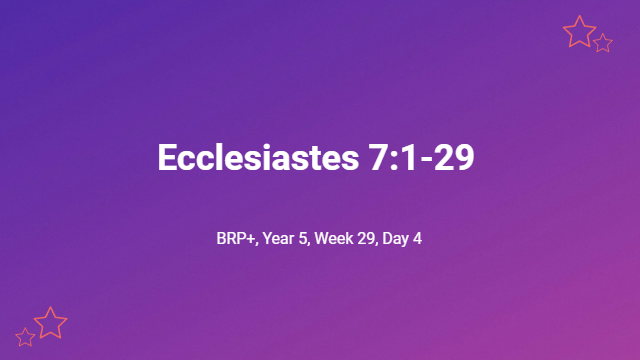Ecclesiastes 7:1-29
Q.1. Did Solomon have an excessively negative view of life? What was his message as he contrasted wisdom with foolishness? Where did he see God in life? – (Ecc.7:1-14)
Though God gave Solomon wisdom and insight, Solomon was a sinner just as we are. This meant that his fame and wealth corrupted him, and he disregarded many of the guidelines that God had given him (Dt.17:14-20). So many of his conclusions about life were based on his own flawed conduct. He revealed his own frustration with life. He had everything he could want, but he was far from satisfied. His conclusions make sad reading. We see the truth more clearly during the ‘down times’, than we do during the ‘good times’ – The mind of the wise is in the house of mourning, while the mind of fools is in the house of pleasure (Ecc.7:4 c.f. 7:1-3, 5-6). Solomon surveyed the effects of oppression, bribery, and anger, and concluded – The end of a matter is better than its beginning … (Ecc.7:8). He presented scenarios that showed that wisdom is a better reason for submitting to the sovereign ways of God – In the day of prosperity be happy, but in the day of adversity consider– God has made the one as well as the other so that man will not discover anything that will be after him (Ecc.7:14 c.f. 10-13). We learn patience and humility because we do not have ultimate control (Ecc.7:8).
Q.2. How can Solomon’s experiences of life help us to maintain perspective? Why should we factor in man’s failures? What is the advantage of fearing God? – (Ecc.7:15-22)
Solomon illustrated that untimely deaths are not confined to either the righteous, or to the wicked (Ecc.7:15-17). Yet there is much more to be gained by – … the one who fears God … (Ecc.7:18-19). He warned us to not trust in others, because – there is not a righteous man on earth who continually does good and who never sins (Ecc.7:20). This knowledge will help us to show grace regarding what others may say about us, since – … you likewise have many times cursed others (Ecc.7:22).
Q.3. What is it about God that makes life so mysterious? How did Solomon’s approach to living and relationships affect his conclusions? – (Ecc.7:23-29 c.f. 2:1-3, 8)
Even with all his wisdom, Solomon admitted man’s limitations, when trying to explain life – What has been remote and exceedingly mysterious. Who can discover it? (Ecc.7:24). The reason is that God is infinitely great, and even the wisest among humans are finite and fallen. Solomon violated the principles that God had laid down for kings, when – … ‘I provided for myself male and female singers and the pleasures of men–many concubines’ (Ecc.2:8 c.f. 2:1-3 and Dt.17:14-20). Solomon never knew the joy of developing oneness with one wife (Ecc.7:26-28 c.f. 9:9). The views expressed by Solomon about women were affected by his inability to live with a woman in an understanding way (c.f. 1 Pet.3:7).

